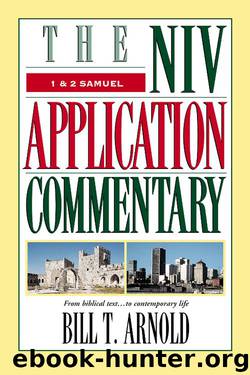1 and 2 Samuel by Bill T. Arnold

Author:Bill T. Arnold [Arnold, Bill T.]
Language: eng
Format: epub
Tags: Religion, Biblical Commentary, Old Testament, Reference, Bible Study, Bible Study & Reference, Christian Books & Bibles, Commentaries, Education, Encyclopedias & Subject Guides, Guides, Old Testament Study, Religion & Spirituality, Religious Studies & Reference
ISBN: 9780310520726
Google: YgfNBAAAQBAJ
Amazon: B00OFMXWC2
Barnesnoble: B00OFMXWC2
Publisher: Zondervan
Published: 2014-11-03T08:00:00+00:00
David Avenges the Amalekite Raid (30:7–25)
THE IMPORTANT ASSERTION of David’s faith in 30:6 is a general statement in which the narrator reveals David’s inner life and emphasizes his spiritual reliance on Yahweh. Now we learn the specifics. David calls for Abiathar to bring the priestly ephod containing the Urim and Thummim, the divinely sanctioned and approved means of seeking divine guidance. David’s faith finds expression in concrete actions that will reverse this seemingly hopeless situation.
The particular terminology used in 30:7–8 refers to the practice of “inquiring” (lit., “asking”) of Yahweh, that is, seeking his will in specific situations. As we have seen elsewhere in 1-2 Samuel, this phrase is a technical expression for inquiring an oracle of God when a simple affirmative or negative response can be anticipated.11 Inquiries could be answered by means of the sacred lots, the Urim and Thummim, stored in the ephod (Ex. 28:30; Lev. 8:8).12 The good priest Ahimelech had earlier inquired of Yahweh on David’s behalf, which may have been when David learned the value of such inquiries (1 Sam. 22:10, 13, 15). David’s rise to kingship is characterized by the importance he attached to seeking guidance from God (see 23:2, 4; also 2 Sam. 2:1; 5:19, 23; 16:23).
In fact, the narrative uses this practice of David to continue the contrast between Saul and David. Yahweh has stopped answering Saul’s inquiries, presumably because Saul has made up his mind before asking (14:36–37). As we saw in the preceding chapter, the silence of Yahweh persists until the end for Saul (28:6). By contrast, David faithfully inquires of Yahweh and continues to receive guidance.
The victory over the Amalekite marauders is narrated in such a way as to highlight an important feature of David’s character: He is a leader who shows magnanimity to individuals in vulnerable situations, especially if they are soldiers loyal to him (cf. 2 Sam. 10:2–5). He identifies with people and understands their needs. First Samuel 30 highlights two such episodes. (1) David is generous and gracious in his treatment of an Egyptian who had been an Amalekite slave (30:11–15). David obviously wants to use him as an informant, who can lead him to the Amalekite camp. But he has been abandoned by the Amalekite master when he became ill and was left in a field to starve to death. In contrast, David and his men feed and nurse him to health.
(2) David intervenes in a dispute among his followers concerning the distribution of their plunder. He magnanimously decides to include those too exhausted to make the journey to the Amalekite encampment and opted to stay with the supplies. David thus establishes the principle of equality that lasts throughout his reign (30:24): “Share and share alike!”
The reversal of David’s losses at the hands of the Amalekites is a stunning victory. “On their return from Aphek, David and his men had faced their ruined and abandoned homes; everything seemed lost, and David was in danger of being stoned to death.”13 But through his faith in
Download
This site does not store any files on its server. We only index and link to content provided by other sites. Please contact the content providers to delete copyright contents if any and email us, we'll remove relevant links or contents immediately.
The Five People You Meet in Heaven by Mitch Albom(3548)
The Secret Power of Speaking God's Word by Joyce Meyer(3154)
Real Sex by Lauren F. Winner(3001)
Name Book, The: Over 10,000 Names--Their Meanings, Origins, and Spiritual Significance by Astoria Dorothy(2967)
The Holy Spirit by Billy Graham(2938)
0041152001443424520 .pdf by Unknown(2841)
How The Mind Works by Steven Pinker(2811)
ESV Study Bible by Crossway(2772)
Ancient Worlds by Michael Scott(2670)
Churchill by Paul Johnson(2574)
The Meaning of the Library by unknow(2558)
The ESV Study Bible by Crossway Bibles(2544)
The Gnostic Gospels by Pagels Elaine(2516)
MOSES THE EGYPTIAN by Jan Assmann(2410)
Jesus by Paul Johnson(2349)
City of Stairs by Robert Jackson Bennett(2337)
The Complete Dead Sea Scrolls in English (7th Edition) (Penguin Classics) by Geza Vermes(2269)
The Nativity by Geza Vermes(2221)
Ancient Near Eastern Thought and the Old Testament by John H. Walton(2217)
